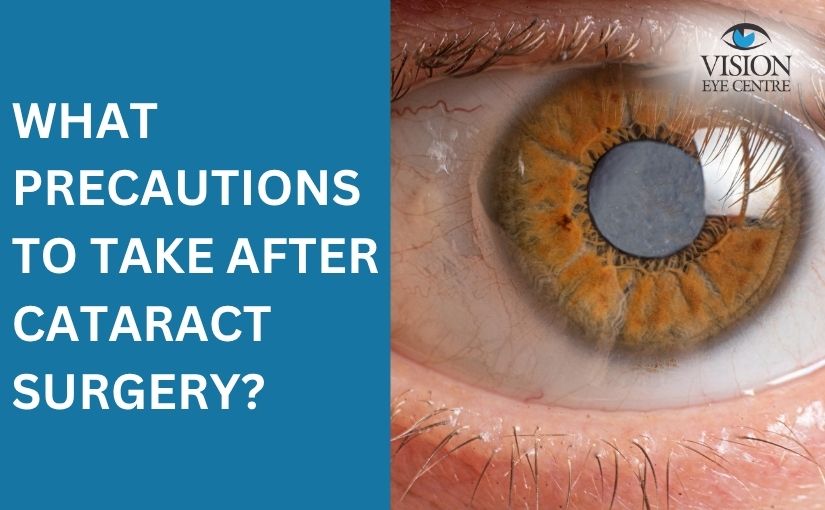
What Precautions to Take After Cataract Surgery?
Oct 16, 2025
Suppose you’ve recently undergone Cataract Surgery or are planning to have one soon. In that case, it’s essential to understand that post-surgery care plays a major role in ensuring a smooth and speedy recovery. Knowing what precautions to take after cataract surgery helps you avoid complications and ensures the best results from your procedure. The healing process is usually quick, but following the right care instructions from your eye specialist at Vision Eye Centre can significantly enhance your visual recovery.
In this article, we’ll discuss in simple language the most important precautions to take after cataract surgery, including what you should and shouldn’t do during your recovery period.
Understanding Cataract Surgery
Before exploring the precautions, let’s briefly understand what cataract surgery involves.
A cataract occurs when the natural lens of your eye becomes cloudy, leading to blurry vision, glare, and poor night vision. Cataract Surgery is a procedure where the cloudy lens is removed and replaced with a clear artificial lens (called an intraocular lens or IOL).
The procedure is typically painless and performed under local anaesthesia. It takes about 15–30 minutes and allows most patients to return home the same day.
However, proper post-surgery care is crucial for a successful outcome. While cataract surgery is one of the safest and most effective eye surgeries, ignoring precautions can lead to delayed healing or infection.
Immediate Precautions After Cataract Surgery
The first 24–48 hours after cataract surgery are the most delicate. Here’s what you should do during this period:
1. Do Not Rub or Touch Your Eye
Your operated eye will feel slightly itchy or watery after the surgery. Avoid rubbing, pressing, or touching it, as this may displace the newly implanted lens or cause infection. If you feel irritation, use the prescribed eye drops instead.
2. Use Prescribed Eye Drops Regularly
Your doctor will prescribe antibiotic and anti-inflammatory eye drops to prevent infection and control inflammation. Use them exactly as directed — at the right time and dosage — even if your eye feels fine.
3. Wear a Protective Eye Shield
After surgery, your doctor may provide an eye shield or protective glasses. Always wear them, especially while sleeping, to avoid accidental touching or injury.
4. Avoid Driving Immediately
Do not drive for at least 24 to 48 hours after the operation. Your vision may still be adjusting, and exposure to bright light could cause discomfort.
5. Take Adequate Rest
Your eyes need time to recover. Avoid straining activities, bending forward, or lifting heavy objects for a few days.
These are the most immediate precautions to take after cataract operation, and they lay the foundation for a healthy recovery.
Precautions to Take After Cataract Operation – Diet and Lifestyle
Your diet and lifestyle choices can also impact your recovery process.
1. Eat a Nutritious Diet
Include foods rich in vitamins A, C, and E, along with omega-3 fatty acids. These nutrients support eye health and speed up recovery. Eat fresh fruits like oranges, papaya, and leafy greens such as spinach and kale.
2. Stay Hydrated
Drink plenty of water and fluids to keep your body and eyes hydrated.
3. Avoid Smoking and Alcohol
Smoking delays healing and increases the risk of eye infection. Alcohol can also interfere with medications and should be avoided for at least a week.
4. Manage Health Conditions
If you have diabetes or high blood pressure, keep them under control. Uncontrolled sugar levels can delay recovery or cause infections.
Long-Term Precautions After Cataract Surgery
Even after the first few weeks, your eyes continue to heal internally. To maintain long-term eye health, follow these habits:
1. Continue Regular Check-ups
Visit your doctor as recommended. Eye specialists at Vision Eye Centre will monitor your healing progress and ensure that your vision stabilises properly.
2. Protect Your Eyes from Injury
Always wear protective eyewear when working outdoors or in dusty areas.
3. Limit Screen Time
In the first few weeks, limit time on phones, laptops, or television to reduce eye strain.
4. Maintain Eye Hygiene
Wash your hands before applying eye drops or touching your face to prevent infection.
5. Avoid Swimming for at Least a Month
Swimming pools contain chlorine and bacteria that can harm your healing eye. Wait for your doctor’s approval before resuming.
When to Contact Your Doctor
While mild irritation or watering is normal, contact your doctor at Vision Eye Centre immediately if you experience:
-
Severe pain or redness
-
Sudden vision loss or blurriness
-
Discharge or swelling
-
Light flashes or floaters
-
Nausea or vomiting
Timely reporting of such symptoms ensures any issue is addressed early.
Common Mistakes to Avoid After Cataract Surgery
Many patients make small mistakes after surgery that can affect their healing. Here are some you should avoid:
-
Skipping prescribed eye drops
-
Sleeping without an eye shield
-
Getting dust or soap into the eyes
-
Returning to strenuous activity too soon
-
Ignoring follow-up visits
Following your doctor’s advice carefully ensures the best visual results and smooth recovery.
Recovery Timeline After Cataract Surgery
-
First 24 hours: Blurred vision, mild itching, or light sensitivity are common.
-
2–5 days: Vision begins to clear, and irritation reduces.
-
1–2 weeks: You can resume normal daily activities with care.
-
4–6 weeks: Full healing usually occurs, and the final vision is stabilised.
Your recovery may vary slightly depending on your overall health and adherence to precautions.
Why Choose Vision Eye Centre for Cataract Surgery
When it comes to Cataract Surgery in Delhi, choosing an experienced and trusted hospital is essential. Vision Eye Centre is the most advanced and reliable Eye Hospital in Delhi, known for its state-of-the-art equipment, expert surgeons, and compassionate patient care.
Here’s why Vision Eye Centre is a preferred choice:
-
Advanced phacoemulsification and laser-assisted cataract surgery
-
Experienced team of ophthalmologists
-
Personalised treatment plans for each patient
-
NABH-accredited and internationally recognised facilities
-
Safe and comfortable recovery environment
With Vision Eye Centre, you can expect expert guidance not just during surgery, but also in post-operative care — ensuring your eyes heal quickly and safely.
Tips for Smooth Recovery at Home
-
Follow your medication schedule strictly.
-
Use clean tissues or cotton to wipe any discharge.
-
Avoid sneezing or coughing forcefully.
-
Sleep on the unoperated side to prevent pressure.
-
Don’t skip your follow-up visits even if you feel fine.
Conclusion
Cataract surgery is one of the safest and most effective ways to restore clear vision. However, knowing what precautions to take after cataract surgery ensures smooth healing and long-term success. Simple habits like using prescribed eye drops, avoiding water exposure, wearing sunglasses, and taking enough rest can make a huge difference in your recovery.
If you’re planning Cataract Surgery, trust Vision Eye Centre, where experienced surgeons and advanced technology ensure safe, precise, and comfortable care. With proper post-surgery precautions and regular check-ups, you’ll enjoy clear, bright vision and lasting eye health.
Frequently Asked Questions
1. What precautions should I take after cataract surgery?
Avoid touching or rubbing your eye, keep it protected from dust and water, use prescribed eye drops, and avoid heavy physical activities for at least a week.
2. Can I watch TV after cataract surgery?
Yes, you can watch TV in moderation after a few days, but take frequent breaks to avoid eye strain.
3. When can I wash my face after cataract surgery?
You can wash your face carefully after one day, but make sure no water or soap enters your eyes.
4. How soon can I drive after cataract surgery?
You should wait at least 2–3 days or until your doctor confirms that your vision is stable.
5. What foods help recovery after cataract surgery?
Eat foods rich in Vitamin A, C, and E — such as carrots, oranges, spinach, and almonds — to support healing.
6. When can I resume using eye makeup?
Avoid using eye makeup for 2–3 weeks after surgery to reduce the risk of infection.
7. Can I bend down or lift weights after cataract surgery?
Avoid bending or lifting heavy weights for at least a week, as it can increase pressure in your eyes.

